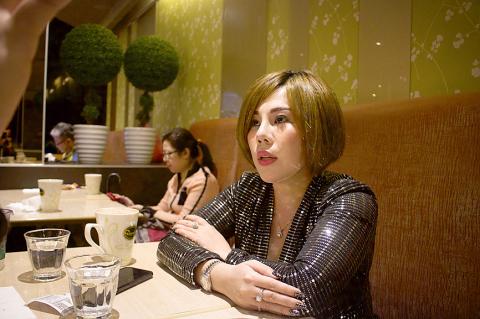A near-death experience prompted Vietnamese bride Chu Pin-chen (朱品臻) to turn her attention to helping others.
Chu, who came to Taiwan 17 years ago after marrying a Taiwanese man, nearly died in hospital nine years ago after developing cerebral edema — an excess accumulation of water in the brain.
After recovering, Chu swore she would devote her life to helping people in need.

Photo: Wang Kuan-jen, Taipei Times
To help her achieve this, Chu put aside 30 percent of her profit from a small business she ran and other investments, using the money to build infrastructure in her hometown in Vietnam and pay the medical expenses of foreign laborers injured in Taiwan.
She plans to start a foundation to help more foreign workers and other disadvantaged people, Chu said.
When she first came to Taiwan in 2002, she had only planned to be a “simple housewife,” Chu said, adding that recovering from a nearly fatal illness changed her outlook.
She faced many challenges in the beginning, but was determined to succeed, she said, adding that she threw herself into studying Mandarin, and learning about Taiwan’s laws and culture.
In 2011, she opened a small restaurant selling snacks, as well as a karaoke parlor, and worked long hours every day between the two businesses.
Chu has even participated in beauty pageants and won, with the prize money going toward helping others.
Chu said that her plans did not initially run as smoothly as she had hoped.
Her first attempt at opening a business failed and she was tricked out of money, as she was unfamiliar with the laws and procedures, she said.
However, she was not deterred by the experience and received help from her community, she said.
Being able to help others is a great feeling, as she grew up in a poor community, Chu said.
One of those who recently received her help was a Vietnamese laborer who fell from the 12th floor of a building he was working on. When Chu heard the news, she visited him in hospital and paid his medical bills.
“I hope I can bring a sense of warmth to fellow Vietnamese who are in a foreign land like I am,” she said.

The Coast Guard Administration (CGA) yesterday said it had deployed patrol vessels to expel a China Coast Guard ship and a Chinese fishing boat near Pratas Island (Dongsha Island, 東沙群島) in the South China Sea. The China Coast Guard vessel was 28 nautical miles (52km) northeast of Pratas at 6:15am on Thursday, approaching the island’s restricted waters, which extend 24 nautical miles from its shoreline, the CGA’s Dongsha-Nansha Branch said in a statement. The Tainan, a 2,000-tonne cutter, was deployed by the CGA to shadow the Chinese ship, which left the area at 2:39pm on Friday, the statement said. At 6:31pm on Friday,

The Chinese People’s Liberation Army Navy’s (PLAN) third aircraft carrier, the Fujian, would pose a steep challenge to Taiwan’s ability to defend itself against a full-scale invasion, a defense expert said yesterday. Institute of National Defense and Security Research analyst Chieh Chung (揭仲) made the comment hours after the PLAN confirmed the carrier recently passed through the Taiwan Strait to conduct “scientific research tests and training missions” in the South China Sea. China has two carriers in operation — the Liaoning and the Shandong — with the Fujian undergoing sea trials. Although the PLAN needs time to train the Fujian’s air wing and

Taiwanese celebrities Hank Chen (陳漢典) and Lulu Huang (黃路梓茵) announced yesterday that they are planning to marry. Huang announced and posted photos of their engagement to her social media pages yesterday morning, joking that the pair were not just doing marketing for a new show, but “really getting married.” “We’ve decided to spend all of our future happy and hilarious moments together,” she wrote. The announcement, which was later confirmed by the talent agency they share, appeared to come as a surprise even to those around them, with veteran TV host Jacky Wu (吳宗憲) saying he was “totally taken aback” by the news. Huang,

The American Institute in Taiwan (AIT) put Taiwan in danger, Ma Ying-jeou Foundation director Hsiao Hsu-tsen (蕭旭岑) said yesterday, hours after the de facto US embassy said that Beijing had misinterpreted World War II-era documents to isolate Taiwan. The AIT’s comments harmed the Republic of China’s (ROC) national interests and contradicted a part of the “six assurances” stipulating that the US would not change its official position on Taiwan’s sovereignty, Hsiao said. The “six assurances,” which were given by then-US president Ronald Reagan to Taiwan in 1982, say that Washington would not set a date for ending arm sales to Taiwan, consult